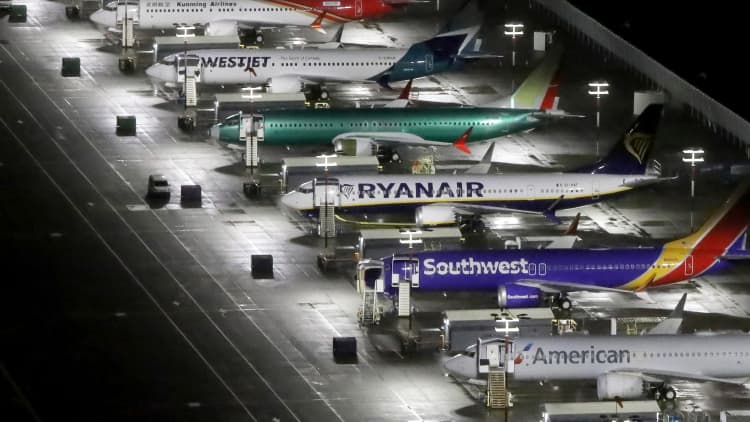Boeing is closely monitoring the volatile U.S. trade war with China, as heightened tariffs pushed the company to cut production of its 787 Dreamliner aircraft until either an exception or a resolution is found.
The company said in its third-quarter results that, beginning around the end of next year, Boeing will cut monthly production of 787 aircraft to 12 per month, citing "the current global trade environment." The reduced production will last at least through 2022.
During Boeing's call with shareholders, CEO Dennis Muilenburg gave more context as to his company's involvement in the White House's negotiations – as well as what Boeing is pushing to get from even a partial trade deal.

"We also continue to monitor and inform the U.S.-China trade discussions," Muilenburg said, adding that "we remain hopeful that airplanes will ultimately be part of the trade solution."
President Donald Trump's trade war has taken a toll on many U.S. companies that export to China, spanning industries from software to cars to agriculture and more. Muilenburg noted that the U.S. "aerospace industry is the largest exporter" to China, contributing about $80 billion in trade surplus per year. While he expects Chinese demand for aircraft will continue to climb, Boeing does not see that demand coming in right now.
"In the near term, as we have shared, the U.S.-China trade situation has presented challenges for our wide-body production plans," Muilenburg said. "The lack of orders from China in the past couple of years has put pressure on the production rate."
Boeing forecast last month that China will need 8,090 new airplanes over the next 20 years, worth nearly $1.3 trillion in all. "China clearly needs lift capacity," Muilenburg said, but the trade war means "we don't have any firm orders from China at this point."
Despite the lack of access to China's aerospace market, Boeing has optimistic "prospects for the long-term wide-body market," Muilenburg said. Globally, Boeing expects demand for about 1,000 "small to medium-sized" wide-body airplanes over the next 10 years. But, until American and Chinese leaders put ink to paper on a deal, or at least an exception, Boeing will not be able to serve China's growing market.
WATCH: Sonnenfeld on how Boeing's board handled text message fallout



